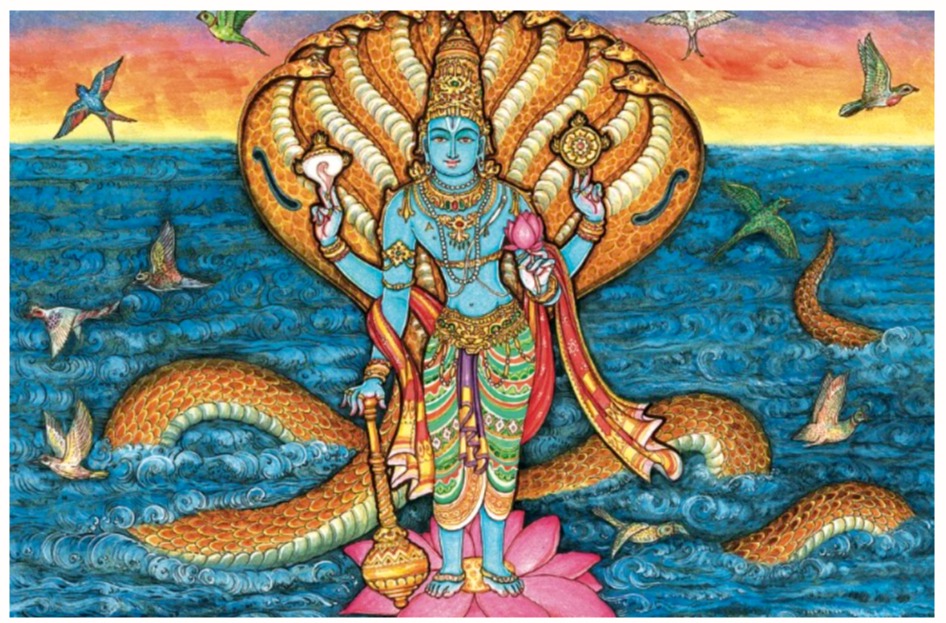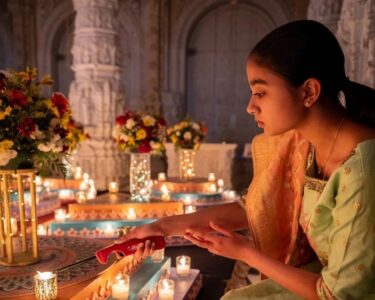PART 1: TEN QUESTIONS
HUMANITY’S MOST PROFOUND FAITH IS NOW A GLOBAL PHENOMENON. STUDENTS, TEACHERS, NEIGHBORS AND FRIENDS ARE FULL OF QUESTIONS. MISCONCEPTIONS RUN RAMPANT. HERE ARE TEN THOUGHTFUL ANSWERS YOU CAN USE TO SET THE RECORD STRAIGHT.
Have you ever been put on the spot with a provocative question about Hinduism, even one that really shouldn’t be so hard to answer? If so, you are not alone. It takes some good preparation and a little attitude adjustment to confidently field queries on your faith be they from friendly co-workers, students, passersby or especially from Christian evangelists. Back in the spring of 1990, a group of teens from the Hindu Temple of Greater Chicago, Lemont, sent a request to Hinduism Today for “official answers ” to nine questions they were commonly asked by their peers. These questions had perplexed the Hindu youth themselves; and their parents had no convincing answers. Satguru Sivaya Subramuniyaswami took up the challenge and provided the following answers to the nine questions. Perusing the list for this edition of the magazine, we thought it crucial to add a tenth dialog on caste, since that is the most relentless criticism Hinduism faces today.
Let’s begin with advice on the attitudes to hold when responding. First, ask yourself, “Who is asking the question?” Millions of people are sincerely interested in Hinduism and the many Asian religions. So, when asked about Hinduism, don’t be defensive, even if the questioner seems confrontational. Instead, assume that the person really wants to learn. Of course, some only want to harass, badger and turn you to their view. If you sense this is the case, feel free to smile and courteously dismiss yourself without any attempt to answer, lest you simply add fuel to his fires.
With all this in mind, it is still best never to answer a question about religion too boldly or too immediately. That might lead to confrontation. Offer a prologue first, then come to the question, guiding the inquirer toward understanding. Your poise and deliberateness gives assurance that you know what you are talking about. It also gives you a moment to think and draw on your intuitive knowing. Before going deeply into an answer, always ask the questioner what his religion is. Knowing that, you can address his particular frame of mind and make your answer most relevant. Another key: have confidence in yourself and your ability to give a meaningful and polite response. Even to say “I am sorry. I still have much to learn about my religion and I don’t yet know the answer to that ” is a meaningful answer. Honesty is always appreciated. Never be afraid to admit what you don’t know, for this lends credibility to what you do know.
Here are four prologues that can be used, according to the situation, before you begin to actually answer a question. 1) “I am really pleased that you are interested in my religion. You may not know that one out of every six people in the world is a Hindu.” 2) “Many people have asked me about my tradition. I don’t know everything, but I will try to answer your question.” 3)”First, you should know that in Hinduism, it is not only belief and intellectual understanding that is important. Hindus place the greatest value on experiencing each of these truths personally.” 4) The fourth type of prologue is to repeat the question to see if the person has actually stated what he wants to know. Repeat the question in your own words and ask if you have understood his query correctly. If it’s a complicated question, you might begin by saying, “Philosophers have spent lifetimes discussing and pondering questions such as this, but I will do my best to explain.”
Have courage. Speak from your inner mind. Sanatana Dharma is an experiential path, not a dogma, so your experience in answering questions will help your own spiritual unfoldment. You will learn from your answers if you listen to your inner mind speak. This can actually be a lot of fun. The attentive teacher always learns more than the student.
After the prologue, address the question without hesitation. If the person is sincere, you can ask, “Do you have any other questions?” If he wants to know more, then elaborate as best you can. Use easy, everyday examples. Share what enlightened souls and scriptures of Hinduism have said on the subject. Remember, we must not assume that everyone who asks about Hinduism is insincere or is challenging our faith. Many are just being friendly or making conversation to get to know you. So don’t be on the defensive or take it all too seriously. Smile when you give your response. Be open. If the second or third question is on something you know nothing about, you can say, “I don’t know. But if you are really interested, I will find out, mail you some literature or lend you one of my books.” Smile and have confidence as you give these answers. Don’t be shy. There is no question that can be put to you in your birth karmas that you cannot rise up to with a fine answer to fully satisfy the seeker. You may make lifelong friends in this way.
Each of the ten answers is organized with a short response that can be committed to memory, a longer answer, and a detailed explanation. Many questioners will be content with the short, simple answer, so start with that first. Use the explanation as background information for yourself, or as a contingency response in case you end up in a deeper philosophical discussion. Additional resources can be found at: http://www.himalayanacademy.com/basics/ [http://www.himalayanacademy.com/basics/].
1. WHY DOES HINDUISM HAVE SO MANY GODS?
HINDUS ALL BELIEVE IN ONE SUPREME GOD WHO CREATED THE UNIVERSE. HE IS ALL-PERVASIVE. HE CREATED MANY GODS, HIGHLY ADVANCED SPIRITUAL BEINGS, TO BE HIS HELPERS.
Contrary to prevailing misconceptions, Hindus all worship a one Supreme Being, though by different names. This is because the peoples of India with different languages and cultures have understood the one God in their own distinct way. Through history there arose four principal Hindu denominations–Saivism, Shaktism, Vaishnavism and Smartism. For Saivites, God is Siva. For Shaktas, Goddess Shakti is supreme. For Vaishnavites, Lord Vishnu is God. For Smartas–who see all Deities as reflections of the One God–the choice of Deity is left to the devotee. This liberal Smarta perspective is well known, but it is not the prevailing Hindu view. Due to this diversity, Hindus are profoundly tolerant of other religions, respecting the fact that each has its own pathway to the one God.
Hindus also believe in many Gods who perform various functions, like executives in a large corporation. These should not be confused with the Supreme God. These Divinities are highly advanced beings who have specific duties and powers –not unlike the heavenly spirits, overlords or archangels revered in other faiths. Each denomination worships the Supreme God and its own pantheon of divine beings.
Read the rest @ https://www.hinduismtoday.com/magazine/april-may-june-2004/2004-04-ten-questions-people-ask-about-hinduism-and-ten-terrific-answers/






